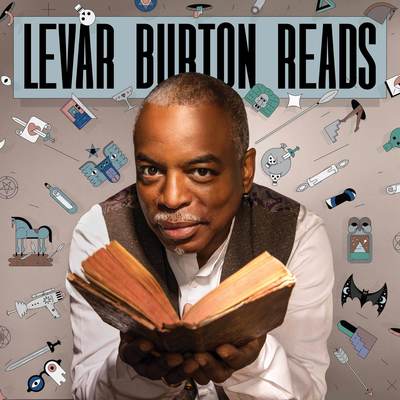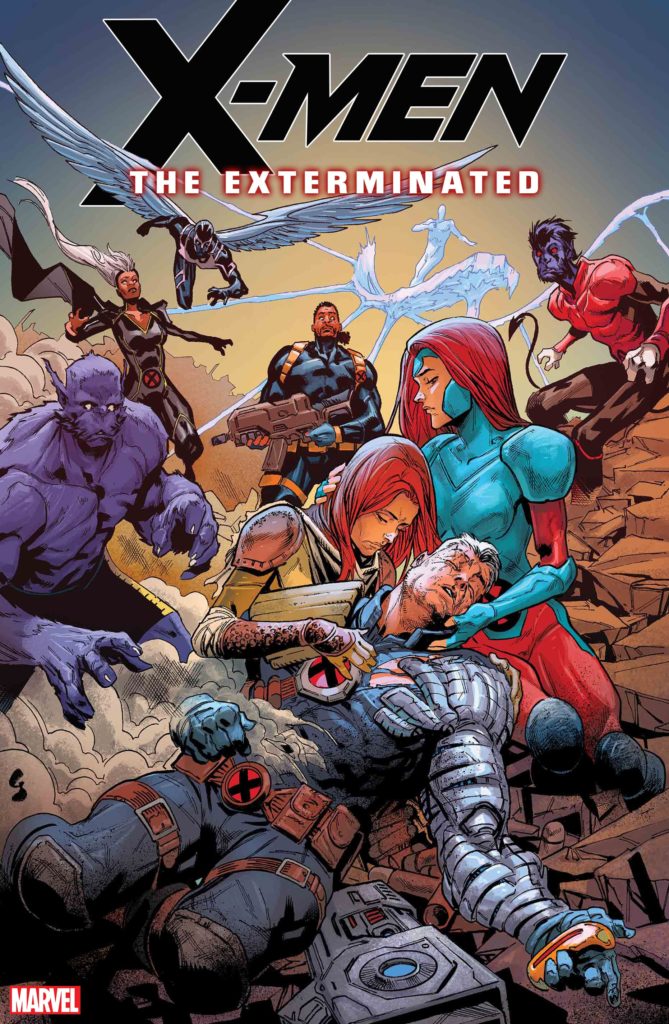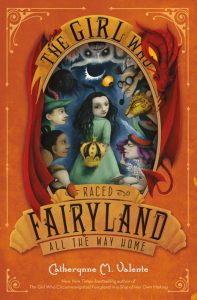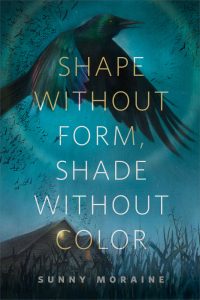(1) LEVAR BURTON. The good news is: Episode 32 of LeVar Burton Reads features the actor’s voicing of “Jackalope Wives” by Ursula Vernon.
(2) FLORENCE. The bad news is, the hurricane is bearing down on Oor Wombat –
The sky is bright blue with puffy white clouds and I’m just like “can we get this hurricane OVER already?” Seriously, I got stuff to do.
— Kingfisher & Wombat (@UrsulaV) September 11, 2018
(3) DOMINOS START TO FALL. Tampa Bay Online reports: “In wake of San Diego Comic Con trademark case, Tampa Bay Comic Con changes name”.
Tampa Bay Comic Con has changed its name to Tampa Bay Comic Convention.
The change comes less than two weeks after a federal judge in California ordered organizers of Salt Lake Comic Con to pay nearly $4 million in attorneys’ fees and costs to San Diego Comic Convention in a trademark infringement suit.
With the award, judge Anthony J. Battaglia affirmed a December 2017 jury verdict that Dan Farr Productions infringed on San Diego Comic Con’s trademarks by operating conventions under the name “Salt Lake Comic Con.”
Tampa Bay Comic Con co-founder Stephen Solomon, a manager at Imaginarium, the company that has run Tampa Bay Comic Con and similarly-branded comic conventions around the U.S. since 2010, confirmed the name change Wednesday after re-branded images appeared on the convention’s social media. Solomon declined to comment on whether that ruling had anything to do with the Tampa Bay Comic Con name change.
(4) SPECIAL CLARION WEST WORKSHOP. Fireside Magazine’s Elsa Sjunneson-Henry will teach a Clarion West One-Day Workshop on “Worldbuilding for Disabled Characters” in Seattle on October 7. Registration info at the link.
The world as it is now, is not what we would call disability friendly. The social model suggests that disability has little to do with one’s medical condition, and everything to do with how society reacts to disability. This class will go over both models of disability (social and medical) and talk about how theories of disability can be used to create your world to include disabled characters. How do magic systems work without creating loopholes to cure disabilities in your setting? How can disability exist on a space station?
This class will help you not only envision the contemporary setting of today with a better understanding of what disabled characters go through, but to create worlds without barriers (or with barriers that aren’t erasure.)
(5) LONDON’S FORBIDDEN PLANET. The Independent expresses its appreciation for Forbidden Planet, celebrating its 40th anniversary: “How cult comic book shop Forbidden Planet changed the way we consume geek culture”.
…Back in the 1970s and early 1980s, American comic books could be picked up in newsagents, often shelved alongside the home-produced titles such as Beano, Misty, Whizzer and Chips, and Warlord.
But while you could generally guarantee that your friendly neighbourhood newsagent would be able to procure for you British comics week in and week out, American titles such as Spider-Man were a different matter. Supply was random and the monthly comics would appear in uncertain quantities, and you could never guarantee that your newsagent would get the following month’s Uncanny X-Men, or even that they would get in any American comics at all….
Today, most towns have a specialist comic shop which works on this model, but one of the most venerable and successful brands is Forbidden Planet, which is celebrating its 40th anniversary and enjoying a position at the top of the market for not only monthly comics but the ever-growing world of geek culture that takes in action figures, toys and collectible movie merchandise.
(6) LE GUIN’S IMPACT. Becky Chambers explains “How The Left Hand of Darkness Changed Everything” at LitHub.
…I wasn’t around when the book made waves in 1969, but ripples remained in 2001, that most futuristic of years. I was in the thick of adolescence, and in a fit of who-cares-about-college rebellion, I’d abandoned Honors English. I was sick of morality tales about brooding men and tragic women, of five-paragraph essays and teachers who didn’t sympathize with my indignation toward how Odysseus treated Penelope. Instead, I enrolled in an elective course: Science Fiction and Fantasy. I walked in there, with my Star Wars notebook and my Star Trek sensibilities and my brain full of role-playing games, and I felt like I’d beat the system. Like I was getting cake for breakfast….
…I soon discovered that elective courses still meant book reports, and my teacher recommended me a title: The Left Hand of Darkness. I still have the copy I bought for class, acquired on a bookstore trip involving my parents’ car and my parents’ money. It’s sitting beside my keyboard now, dog-eared and scarred, full of acid green highlighter. The highlighter isn’t related to the book report. The highlighter came after, as I read the book again and again and again. I can’t say if I’d read any science fiction written by a woman before that point, but I’d certainly never read any science fiction like that. There were no lasers, no damsels, no chosen ones. There was war, yes, but a real war, a war not for the fate of the galaxy but for hatred and fear (things that rang true while living in America in late 2001). There was science, too, but it wasn’t the science of physics or technology. It was the science of culture. The science of bodies. These sciences were every bit as worthy, The Left Hand said, and writing fictions of them was powerful business….
(7) TOLKIEN IN THE FALL. Adam Roberts cannot resist — “J R R Tolkien, “The Fall of Gondolin” (2018)”. In fact, he really doesn’t want to.
…Tolkien’s son Christopher has, over the last four decades, edited eleven thousand (give or take) posthumous volumes of his father’s unpublished writing. The previous instalment in that endeavour, 2017’s Beren and Lúthien opened with him declaring: ‘in my ninety-third year this is presumptively the last book in the long series of editions of my father’s writings’. Such presumption evidently proved premature, for here is The Fall of Gondolin (HarperCollins 2018), plumped-up with eight full-colour Alan Lee illustrations and prefaced by Christopher Tolkien’s wryly revisited promise: ‘I must now say that, in my ninety-fourth year The Fall of Gondolin is (indubitably) the last’. This is the end/Beleriand friend/The end.
I didn’t need this book. I bought this book anyway. I already knew the story of the mighty human warrior, Tuor, beloved of the Vala Ulmo (a sea-god, Tolkien’s Poseidon), who travels through a Middle Earth occupied by the forces of darkness under the evil Vala Melko (in essence; an in-the-world Satan) and his armies of orcs, Balrogs, dragons and other nasties….
I still bought it, mind.
What did I buy? (Why did I buy it? Well, duh)….
(8) FAULTY APPEALS TO AUTHORITY. Annalee Flower Horne raises the point that arguments about historical accuracy may be undermined by the historical source they rely on. (Thread starts here.)
My point here is not "people of color may be historically inaccurate but so is toothpaste." My point is that our view of what is "historically accurate" is based on a completely made-up view of the past that conforms to culturally-ingrained aesthetic preferences.
— Annalee (@LeeFlower) September 9, 2018
(9) 2018 HUGO ANALYSIS. Mark Kaedrin opines about “Hugo Awards 2018: The Results”.
The Stone Sky wins best novel and N.K. Jemisin becomes the first author ever to win three in a row. I have not been a particular fan of the series, but people seem to love these books. Too much misery porn for my liking, which always kept me at an arms length from the characters and story. Forcing myself to read the three books over the past few years (if I’m going to vote, I’m going to read the books; the authors deserve that much) probably doesn’t help. I don’t see why this series in particular deserved the three-peat, but this third book was actually my favorite of the series, so there is that (in fact, the only real baffling winner in the series was the second book, which suffered from clear middle-book-in-a-trilogy problems. I can definitely see why the first and third books won.) The other funny thing about this is that a few years ago, they created a whole award for “Best Series” that could have potentially cut down on the number of sequels in the Best Novel category, but that clearly isn’t happening. Scalzi’s Collapsing Empire came in second, and probably would have been my choice (though I certainly get the criticisms of it, it was a lot more fun and pushed my SF buttons more than most of the other nominees). New York 2140 came in last place, which also matches my preference…
(10) TODAY’S DAY
#StarTrekDay Meets #BatmanDay pic.twitter.com/WGV8MMCKAF
— Francesco Francavilla (@f_francavilla) September 9, 2018
(11) QUOTE OF THE DAY
“I was continuing to shrink, to become… what? The infinitesimal? What was I? Still a human being? Or was I the man of the future? If there were other bursts of radiation, other clouds drifting across seas and continents, would other beings follow me into this vast new world? So close – the infinitesimal and the infinite. But suddenly, I knew they were really the two ends of the same concept. The unbelievably small and the unbelievably vast eventually meet – like the closing of a gigantic circle. I looked up, as if somehow I would grasp the heavens. The universe, worlds beyond number, God’s silver tapestry spread across the night. And in that moment, I knew the answer to the riddle of the infinite. I had thought in terms of man’s own limited dimension. I had presumed upon nature. That existence begins and ends is man’s conception, not nature’s. And I felt my body dwindling, melting, becoming nothing. My fears melted away. And in their place came acceptance. All this vast majesty of creation, it had to mean something. And then I meant something, too. Yes, smaller than the smallest, I meant something, too. To God, there is no zero. I still exist!” – The Incredible Shrinking Man
(12) TODAY’S BIRTHDAYS
[Compiled by Cat Eldridge.]
- Born September 11 – Sharon Lee, 66. She is the co-author with Steve Miller of the Liaden universe novels and stories, as well as other works including the Agent of Change and Great Migration series, and the author by herself of two mystery novels. They strongly oppose fanfic written in their universe.
(13) COMICS SECTION.
- Pluto has a long memory at F Minus.
(14) JUSTICE FOR PLUTO. The University of Central Florida weighs in: “Pluto a Planet? New Research from UCF Suggests Yes”.
The reason Pluto lost its planet status is not valid, according to new research from the University of Central Florida.
In 2006, the International Astronomical Union, a global group of astronomy experts, established a definition of a planet that required it to “clear” its orbit, or in other words, be the largest gravitational force in its orbit.
Since Neptune’s gravity influences its neighboring planet Pluto, and Pluto shares its orbit with frozen gases and objects in the Kuiper belt, that meant Pluto was out of planet status.
However, in a new study published online Wednesday in the journal Icarus, UCF planetary scientist Philip Metzger, who is with the university’s Florida Space Institute, reported that this standard for classifying planets is not supported in the research literature.
The Daily Mail, in “Pluto SHOULD be a planet: Astronomers claim controversial demotion was based on ‘since-disproven reasoning'”, says this is the cruxof the controversy:
Since Neptune’s gravity influences its neighboring planet Pluto, and Pluto shares its orbit with frozen gases and objects in the Kuiper belt, that meant Pluto was out of planet status.
However, the new study reviewed scientific literature from the past 200 years and found only one publication – from 1802 – that used the clearing-orbit requirement to classify planets, and it was based on since-disproven reasoning.
IBTimes wants the decision overturned: “Planet Or Dwarf? Pluto Incorrectly Lost Planetary Status, Study Suggests”.
Apart from that, the researchers also noted scientists have been using the term planet to describe moons as well, like Jupiter’s Europa or Saturn’s Titan.
“We now have a list of well over 100 recent examples of planetary scientists using the word planet in a way that violates the IAU definition, but they are doing it because it’s functionally useful,” Metzger added.
The researchers added bodies, particularly those like Pluto, should be classified on the basis of their natural properties rather than features that could change – like their orbit.
The Universe Today, in “New Reasons why Pluto Should be Considered a Planet After All”, adds depth:
As an alternative, Metzger and his colleagues claim that the definition of a planet should be based on its intrinsic rather than extrinsic properties (such as the dynamics of its orbit), which are subject to change. In short, they recommend that classifying a planet should be based on whether or not it is large enough that its gravity allows for it to achieve hydrostatic equilibrium (i.e. becomes spherical). As Metzger explained:
“Dynamics are not constant, they are constantly changing. So, they are not the fundamental description of a body, they are just the occupation of a body at a current era… And that’s not just an arbitrary definition. It turns out this is an important milestone in the evolution of a planetary body, because apparently when it happens, it initiates active geology in the body.”
(15) THE OPOSSUM FACTOR. Matthew Wills makes his case for Pogo being “The Most Controversial Comic Strip” at JSTOR Daily.
During the 1950s, Walt Kelly created the most popular comic strip in the United States. His strip was about an opossum named Pogo and his swamp-dwelling friends. It was also the most controversial and censored of its time. Long before Garry Trudeau’s Doonesbury blurred the lines between the funny pages and the editorial pages, Kelly’s mix of satiric wordplay, slapstick, and appearances by Joe McCarthy, Richard Nixon, Nikita Khrushchev, J. Edgar Hoover, and the John Birch Society, all in animal form, stirred up the censors.
Taking place in a mythic Okefenokee Swamp, Pogo satirized the human condition as well as McCarthyism, communism, segregation, and, eventually, the Vietnam War. The strip is probably best remembered today for Pogo’s environmentalist’s lament, “We have met the enemy and he is us.”
(16) A BIG, SEXY DINOSAUR. A new book, The Dinosaur Artist, delves into the world of commercial fossil hunters, smuggling, and the international implications. Author Paige Williams is interviewed by Becky Ferreira for Vice’s Motherboard (‘The Bizarre True Crime Story Surrounding a ‘Big Sexy Dinosaur’”) about the book and the stories behind it.
Motherboard: What first inspired you to report on Eric Prokopi’s case, first for The New Yorker and now in a full-length book?
Paige Williams: In the summer of 2009, I happened to be home (I’m from Mississippi). I was sitting in a coffee shop reading the Tupelo Daily Journal, my hometown paper, and came across this little news brief about a dinosaur thief from Montana. His name is Nate Murphy, and he’s in the book—just barely.
But I couldn’t believe there was such a thing as a dinosaur thief. I didn’t understand how it was possible or why anyone would want to do it. I really like subcultures and understanding why people inhabit them, and it just seemed like a world that was fascinating and full of authentic characters—people who are aggressively themselves, who are irreverent, and who sometimes break the law, though most of them don’t.
Then, this Prokopi case came along. I liked it because had so many threads worth exploring—the international trade, the Gobi Desert, Mongolian culture and history, New York, Florida, Virginia, Tucson, and Denver, and every fossil zone in between. It just had a lot worth pursuing and following.
(17) A DIFFERENT KIND OF CLASS. No formal registration for this one:
https://twitter.com/KoryStamper/status/1037694850815148032
(18) BROUGHT TO YOU BY. The Washington Post’s Christian Davenport says NASA is open to ideas for commercialization, including ads in space and having astronauts make commercial endorsements: “Why NASA’s next rockets might say Budweiser on the side”.
The constant creep of corporate America into all aspects of everyday life — from the Allstate Sugar Bowl to Minute Maid Park — may soon conquer a new frontier.
The final frontier.
NASA Administrator Jim Bridenstine has directed the space agency to look at boosting its brand by selling naming rights to rockets and spacecraft and allowing its astronauts to appear in commercials and on cereal boxes, as if they were celebrity athletes….
But during a recent meeting of a NASA advisory council made up of outside experts who provide guidance to the agency, Bridenstine announced he was setting up a committee to examine what he called the “provocative questions” of turning its rockets into corporate billboards the way advertisements decorate NASCAR race cars.
“Is it possible for NASA to offset some of its costs by selling the naming rights to its spacecraft, or the naming rights to its rockets?” Bridenstine said. “I’m telling you there is interest in that right now. The question is: Is it possible? The answer is: I don’t know, but we want somebody to give us advice on whether it is.”
(19) MARVEL. X-Men: The Exterminated #1 arrives this December.
Cable has fallen, and the events of Extermination have left a hole in the X-Men family. What comes next??
In the wake of Cable’s death, his adopted daughter Hope Summers is attempting to deal with her loss – but a dark and terrifying path beckons her, and the X-Men’s own Jean Grey may be her only hope for survival!
This December, CABLE creative team Zac Thompson and Lonnie Nadler re-team for a special one-shot to say good-bye to the time-traveling, fan-favorite mutant – featuring covers by Geoff Shaw and a special back-up story that celebrates the life of Nathan Summers, from legendary X-Men series writer Chris Claremont!
“This issue is our chance to say a proper farewell to Cable, to honor his legacy, and to really see the immense impact the time travelling mutant had on those closest to him,” said Nadler. “Most importantly, it’s about how the Summers family copes with grief, and the difficulty of forging ahead. The issue is packed with fan favorite X-Men from all different eras, and we’re super excited to be bringing them together, despite the somber occasion.”
(20) BOUCHERCON. Tampa Bay Online’s Colette Bancroft had many kind words to say about last week’s Bouchercon: “It’s no mystery why fans, authors gathered for Bouchercon in St. Petersburg”.
…The 1,500 authors and fans (some from as far away as Japan) were in St. Petersburg for Bouchercon 2018, a.k.a. the World Mystery Convention. The annual gathering (named after influential mystery writer and editor Anthony Boucher) began in 1970 and is now one of the biggest mystery conventions in the world.
This was its first stop in St. Petersburg, with approximately 600 writers of crime fiction and true crime on hand to meet and mingle with fans, with many of the top names in the genre strolling the Vinoy’s halls. The event’s special guests were Mark Billingham, Sarah Blaedel, Sean Chercover, Tim Dorsey, Ian Rankin, Karin Slaughter and Lisa Unger. Other luminaries included Ace Atkins, Lawrence Block, Alafair Burke, Lee Child, Michael Connelly, Laura Lippman and Sara Paretsky….
(21) WELCOME OUT-OF-TOWNERS. David Doering found a copy of the pitch made to attendees of the Pacificon (fourth Worldcon) in 1946 to visit the Los Angeles Science Fantasy Society. He notes, “Remarkably, don’t really need to change much at all to describe what I saw in Freehafer Hall the first time I went in 1985 forty years later. (For all I know, the “infamous” 4E trunk might still be in there somewhere…)”
LASFS OPEN HOUSE
CLUB ROOM OPEN FOR YOUR INSPECTION
That famous mecca for all fen, the LASFS CLUB ROOM, will most naturally be open at all times for the benefit of visiting fen, who will naturally be Interested In seeing this famous j?o?i?n?t? place.
You will see the (In) famous Ackerman trunk, repository of Ghu knows what; the fine library we maintain for the benefit of our members; the very spot where those wonderful (who said that?) meetings are held; the many fine original Illustrations which adorn the walls; that mighty project, Donald Warren Bratton’s cardfile of approximately 10,000 cards cross-indexIng all pro-mag stories and authors, as well as books pertaining to our field.
Indeed, lndeedy, your visit will not be complete until you have visited the LASFS Club Room. However, we think it only fair to warn you you will never be the same again after you have been there — in fact, YOU MAY NEVER BE SEEN AGAIN! So while you are more than welcome, you are also given fair warning in advance!
(22) VIDEO OF THE DAY. In Fern on Vimeo, Johnny Kelly looks at what happens to a grieving widow when her husband dies and is resurrected as a friendly houseplant.
[Thanks to JJ, Martin Morse Wooster, Brian Z., Cat Eldridge, Chip Hitchcock, Mike Kennedy, John King Tarpinian, David Doering, Carl Slaughter, and Andrew Porter for some of these stories. Title credit goes to File 770 contributing editor of the day Stoic Cynic.]







